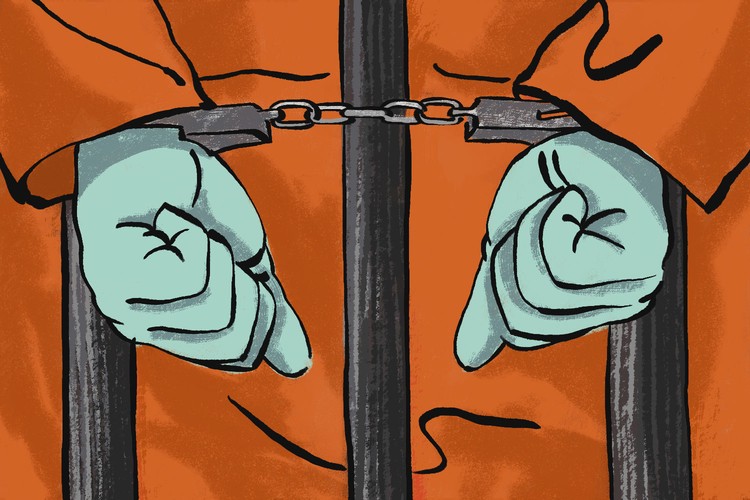Corrupt traffic cop’s sentence “laughable” says judge
Upington traffic officer caught demanding a bribe had been fined R10,000, payable in monthly instalments of R1,000
Imprisonment should be the norm in corruption cases, a high court judge has said. Illustration: Lisa Nelson
- A R10,000 fine imposed on a corrupt traffic officer was “laughable” a Northern Cape High Court judge has said.
- The judge, while increasing the fine to R60,000 payable by the end of January 2024, said this should not serve as a precedent and “direct imprisonment should be the norm” in corruption cases
- Oscar Bongela, and a colleague who has since died, demanded R1,000 from a motorist who was rushing his wife, who was in labour, to hospital.
- Instead of paying the bribe, he went to the police who organised a “sting operation”.
- Judge Mpho Mamosebo said the sentence handed down by the trial court was fatally flawed and not judicial.
A Northern Cape High Court judge has cautioned that direct imprisonment must be the norm when sentencing people convicted of corruption.
Judge Mpho Mamosebo, with Acting Judge AD Olivier concurring, described as “laughable” a sentence imposed by a lower court on an Upington traffic officer, who demanded a R1,000 bribe from a motorist. The officers were fined R10,000, payable in monthly instalments of R1,000, or two years imprisonment.
On appeal by the provincial Director of Public Prosecutions (DPP), the court said the sentence was “fatally flawed and not judicial”.
The court increased the sentence to a fine of R60,000, to be paid by the end of January 2024, or to three years imprisonment, with Judge Mamosebo noting that traffic officer Oscar Bongela had already paid a portion of the fine previously imposed.
However, she said, jail should be the norm.
“I wish to issue this serious warning. This sentencing approach must in no way serve as a precedent. Direct imprisonment ought to be the norm.”
Bongela, who had been a traffic officer for 17 years at the time, was convicted along with colleague Lebogang Tosa of corruption in the local regional court in September 2020. They were both fined R10,000 or, in default of payment, to two years imprisonment.
They were also given three-year, wholly suspended sentences.
The DPP, in the appeal, said the sentences were shockingly lenient and ignored precedent in such matters.
Tosa died before the DPP’s appeal was heard.
Bongela did not participate in the appeal.
According to the record before the court, Bongela was senior to Tosa. They were posted near Upington Main Road when they pulled over Robert Doncaster, who was rushing his wife, who was in labour, to hospital.
They asked him for a bribe of R1,000.
Doncaster drove into town saying he was going to get the money. Instead he went to the police, who swiftly set up a trap.
The police gave Doncaster marked money and fitted him with a recording device.
He paid the money to Tosa. Tosa kept R700 and gave Bongela R300.
After the police pounced, all of the money was recovered.
Judge Mamosebo, in her recent ruling, said “mystifyingly” Bongela was still employed as a traffic officer. At the time of the trial he had been earning R23,000 a month.
The State had pointed out that both Bongela and Tosa had been paid on the day they asked Doncaster for a bribe.
Judge Mamobsebo said the magistrate had not considered relevant case law.
“Corruption, as expressed by so many courts, is a cancer to be dealt with harshly,” she said.
The magistrate had overemphasised the traffic officers’ personal circumstances and downplayed the seriousness of the offence and its impact on society.
“It was inconsiderate and even callous of them to demand a bribe from a person who was clearly acting out of necessity caused by his child’s impending birth,” the judge said.
The fine of R10,000 “was laughable”.
“I am of the view that the monetary aspect of the punishment should be increased steeply to signify the turpitude of the offence committed. I have also had regard that Bongela has retained his employment throughout. It is up to him to devise some means to pay the fine,” she said, saying if he defaulted, he must serve the time.
“The magistrate was far too generous.”
She ordered Bongela to pay a fine of R60,000 and to pay the full balance by 31 January 2024 or serve three years in jail.
Next: 81-year-old Mthatha widow waiting two decades for her house
Previous: No sign of accountability for Thabo Bester’s escape
Letters
Dear Editor
It's laughable when cash in transit heists and other serious crimes committed by thugs are given bail, and it's paid for from the money they stole. Why are they getting bail if they are not working? Crime is their means of survival. If they get a prison sentence, they only serve a third or half of their sentence. It seems to me that crime pays in SA.
© 2023 GroundUp. This article is licensed under a Creative Commons Attribution-NoDerivatives 4.0 International License.
You may republish this article, so long as you credit the authors and GroundUp, and do not change the text. Please include a link back to the original article.
We put an invisible pixel in the article so that we can count traffic to republishers. All analytics tools are solely on our servers. We do not give our logs to any third party. Logs are deleted after two weeks. We do not use any IP address identifying information except to count regional traffic. We are solely interested in counting hits, not tracking users. If you republish, please do not delete the invisible pixel.



